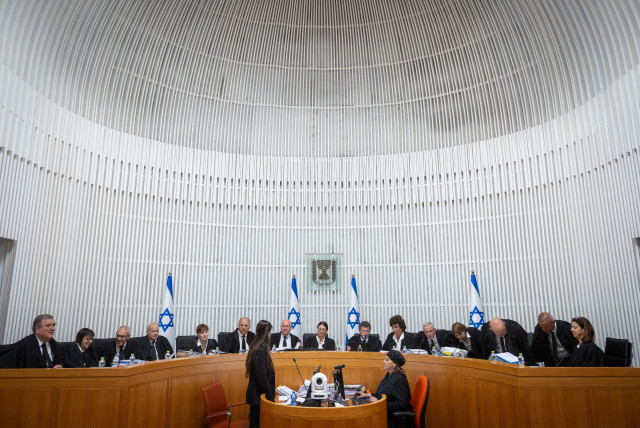A-G's office argues High Court can strike down basic law

Basic laws lack clear boundaries as the Knesset has failed to pass Basic Law: Legislation to establish the rules for the articles.
Attorney-General Office’s representative Aner Helman argued on Tuesday for the authority of the High Court of Justice to strike down the amendment to Basic Law: The Judiciary that limited the reasonableness standard.
Helman said that there were limits to the Knesset’s authority to pass quasi-constitutional basic laws. It was a given in the system laws could not be passed that violated the state’s status as a democratic and Jewish country. He disagreed with statements made by attorney for the government Ilan Bombach that the people would be the check to unacceptable basic laws, saying such things caused worry.
In just this year, three basic law amendments were passed, whereas in the US it had been decades since the last constitutional amendment.
There were checks to the government’s ability to pass any basic law it pleased, and to ensure it didn’t abuse its authority.
Lack of legislation rules requires High Court intervention
The lack of clarity on the boundaries on basic laws came from the Knesset’s failure to pass Basic Law: Legislation to establish the rules for the articles.
The gap of Basic Law: Legislation was filled by Basic Law: The Judiciary, which vested the Supreme Court with the powers of a High Court to rule on state actions and constitutionality.
Sohlberg challenged whether need in the field created authority. Hayut pushed Helman to demonstrate the extreme nature of the law, saying that it was not every day that a basic law was struck down.
The court president said that if it was accepted that the court had the authority, it needed to be proved that using the power was warranted by its impact on democracy.
Helman said that there would be a dramatic impact if the law wasn’t canceled, since it would impact rule of law.
The court president said that if it was accepted that the court had the authority, it needed to be proved that using the power was warranted by its impact on democracy.
Helman said that there would be a dramatic impact if the law wasn’t canceled, since it would impact rule of law. The government could replace gatekeepers and civil servants without providing reason. These political appointees could persecute political opponents by denying them services like licenses. Replacing officials before elections wouldn’t be challenged, threatening the security of the elections.
There are local courts, said Helman, stuck with petitions filed on reasonableness and don’t know what to do with them.
Helman rejected the idea that the reasonableness law could be read down through interpretation, saying his office had examined the legislation and determines that it would require interpretation to the point of rewriting.
Jerusalem Post Store
`; document.getElementById("linkPremium").innerHTML = cont; var divWithLink = document.getElementById("premium-link"); if (divWithLink !== null && divWithLink !== 'undefined') { divWithLink.style.border = "solid 1px #cb0f3e"; divWithLink.style.textAlign = "center"; divWithLink.style.marginBottom = "15px"; divWithLink.style.marginTop = "15px"; divWithLink.style.width = "100%"; divWithLink.style.backgroundColor = "#122952"; divWithLink.style.color = "#ffffff"; divWithLink.style.lineHeight = "1.5"; } } (function (v, i) { });

